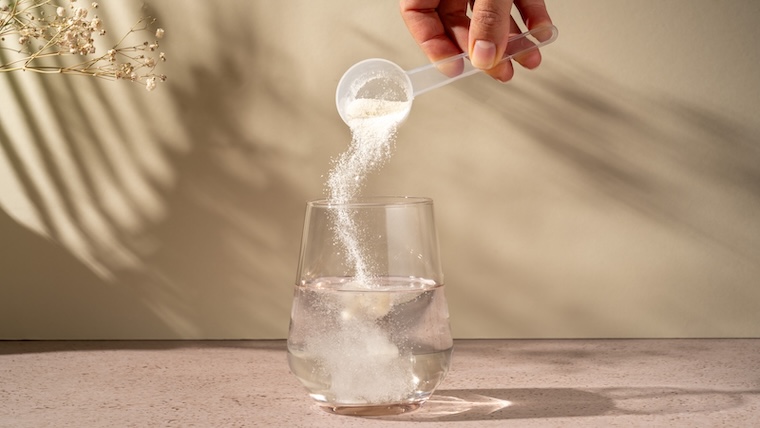Collagen is a building block for skin, bones, muscles, ligaments, tendons, and connective tissues. Collagen peptides, a widely popular supplement, are an easily digestible form of collagen created through hydrolysis, which breaks down collagen proteins into smaller, more absorbable pieces. Research suggests collagen peptide supplementation can aid joint recovery and reduce muscle soreness. (1)
More recently, studies have linked collagen supplementation to increased tendon thickness. Thicker tendons can store more elastic energy, enabling more powerful movements and enhancing physical performance. Stronger tendons with greater load capacity may help reduce the risk of injury.
In the past, Dr. Layne Norton described collagen as one of the least effective protein supplements for muscle growth. However, after reviewing this recent research, he has revisited his perspective, acknowledging how these findings have shifted his previously skeptical stance on collagen supplementation.
Editor’s note: The content on BarBend is meant to be informative in nature, but it should not be taken as medical advice. The opinions and articles on this site are not intended for use as diagnosis, prevention, and/or treatment of health problems. Talking to your doctor before beginning a new fitness, nutritional, and/or supplement routine is always a good idea.
2025 Study on Collagen Supplementation
A March 2025 study investigated the effects of a 12-week resistance training program combined with a placebo or a hydrolyzed collagen supplement. (2) Participants in the supplement group consumed 30 grams of hydrolyzed collagen daily, which included vitamin C to support connective tissue synthesis.
The study involved middle-aged men who completed lower-body resistance training sessions twice per week for the duration of the program. Researchers measured patellar tendon thickness and performance metrics, such as torque, to evaluate the outcomes.
While both groups were similar in baseline characteristics, the group taking hydrolyzed collagen demonstrated significantly greater increases in patellar tendon thickness. They outperformed the placebo group in torque measurements and other performance indicators, highlighting the potential benefits of collagen supplementation when paired with resistance training.
Dr. Norton explained that he is typically skeptical of collagen supplementation, as research indicates it has a weaker impact on muscle protein synthesis, making it less effective for muscle growth than other protein sources like whey. However, collagen is rich in specific amino acids, such as proline, hydroxyproline, and tryptophan, key components of connective tissue in the human body.
Potential Pitfall of the Study
The study could be more comprehensive if it included an additional group taking a different protein source alongside the collagen and placebo groups to help determine whether the observed effects are specifically due to collagen or simply the result of increased protein intake from supplementation.
A study comparing collagen supplementation to whey protein found similar rates of connective tissue synthesis but higher rates of muscle protein synthesis with whey. (3)

Consuming 30 grams of any protein may support connective tissue health. Additionally, the presence of vitamin C in the supplement, known to enhance connective tissue synthesis, could have influenced the study’s results, potentially skewing the findings.
Verdict on Collagen Supplementation
Dr. Norton remains uncertain about the topic. He favored anti-collagen supplements in the past because collagen was not considered an effective protein source.
If you look at [collegen’s] amino acid quality, it is an inferior quality protein supplement. It’s low in leucine, branched-chain amino acids, and essential amino acids.
—Dr. Layne Norton
Although some studies suggest collagen supplementation may improve outcomes, “I just have a tough time when studies show outcomes without a viable mechanism to back it up,” Dr. Norton said.
Whey Protein Supplementation
Dr. Norton recommends whey protein supplementation for several reasons:
- Outcome data on whey protein supplementation are available, and those who use whey protein tend to build lean mass and get stronger than those who do not.
- Whey protein supplementation increases muscle protein synthesis.
- Whey protein’s amino acid quality and breakdown increase muscle protein synthesis because it is high in leucine, branched-chain, and essential amino acids.
- It is a high-quality protein and 100% bioavailable.
While we have outcome data for collagen, the underlying mechanisms have yet to be fully understood.
We don’t know what’s causing these increases in tendon thickness. Is it possible to real effect? Yes.
—Dr. Layne Norton
Dr. Norton wishes the study had included a third group consuming 30 grams of whey protein daily to compare their results with the collagen group. Such an addition could have provided valuable insights and sparked meaningful discussion.

“I’m not ready to say if you want better tendons, you should supplement with collagen. And if you’re somebody with collagen for building muscle, it’s pretty much like the worst protein source you can use,” Dr. Norton concluded.
More In Research
- New Study — One Set, Best Set Enough for Chest Hypertrophy?
- Build Muscle, Lose Fat — Intermittent Fasting, Resistance Training, or Both?
- Train Past Failure for the Thickest Calves
References
- Khatri, M., Naughton, R. J., Clifford, T., Harper, L. D., & Corr, L. (2021). The effects of collagen peptide supplementation on body composition, collagen synthesis, and recovery from joint injury and exercise: a systematic review. Amino acids, 53(10), 1493–1506. https://doi.org/10.1007/s00726-021-03072-x
- Nulty, C. D., Phelan, K., & Erskine, R. M. (2025). Hydrolysed Collagen Supplementation Enhances Patellar Tendon Adaptations to 12 Weeks’ Resistance Training in Middle-Aged Men. European journal of sport science, 25(4), e12281. https://doi.org/10.1002/ejsc.12281
- McKendry, J., Lowisz, C. V., Nanthakumar, A., MacDonald, M., Lim, C., Currier, B. S., & Phillips, S. M. (2024). The effects of whey, pea, and collagen protein supplementation beyond the recommended dietary allowance on integrated myofibrillar protein synthetic rates in older males: a randomized controlled trial. The American journal of clinical nutrition, 120(1), 34–46. https://doi.org/10.1016/j.ajcnut.2024.05.009
Featured image via Shutterstock/Erhan Inga